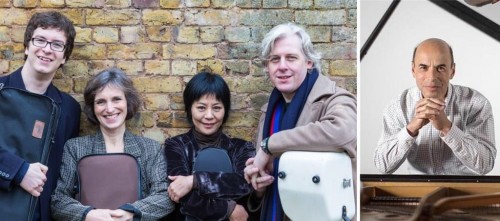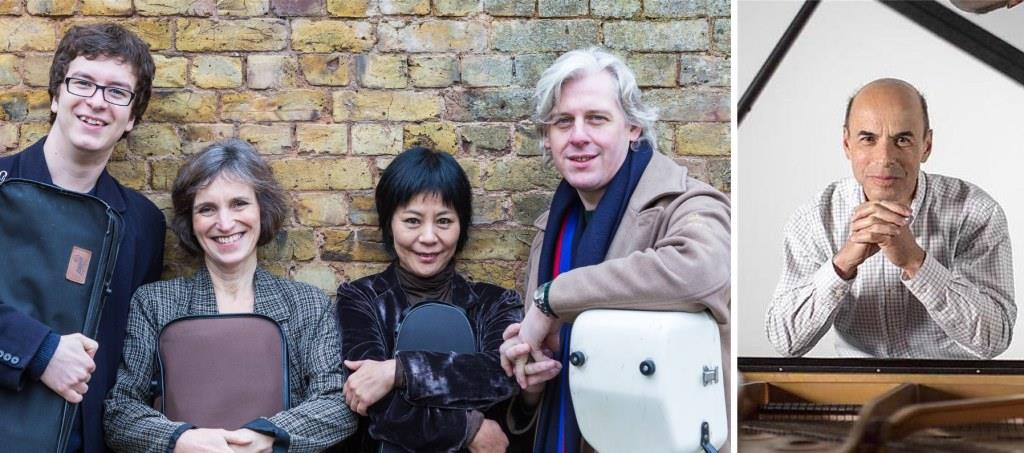 United Kingdom Debussy, Szymanowski, Shostakovich: Dante Quartet, Robert Taub (piano). University of Plymouth Sherwell Centre, Plymouth 17.5.2019. (PRB)
United Kingdom Debussy, Szymanowski, Shostakovich: Dante Quartet, Robert Taub (piano). University of Plymouth Sherwell Centre, Plymouth 17.5.2019. (PRB)

Debussy – String Quartet
Szymanowski – String Quartet No. 2, Op.56
Shostakovich – Piano Quintet, Op.57
The basic remit of the new Musica Viva Concert Series at the University of Plymouth is to bring top-quality internationally acclaimed artists back to the city. The inaugural concert certainly set the bar at the highest level: a visit from the London Mozart Players (LMP) – see review. Things had got off to a flying start, what with the eminently safe, all-Mozart programme, and the very orchestra that had essentially made its name and reputation on the Austrian composer’s music. The resulting packed house was a delight to report on at the time, though admittedly was not too much of a surprise given the programme, the calibre of the performers, and the fact that similar events at this level had been relatively few and far between for some considerable time.
After the sheer euphoria of having the LMP back playing in the city’s Mother Church, the acid test might have been the next recital in the series. The first concert began with a pre-concert talk – now an integral part of future events. How had this gone down, since the audience needed to be in their seats thirty minutes or so before the performance proper, if only to ensure a good vantage point? In the event it was abundantly clear from the outset that the capacity audience was absolutely on song with everything and arrived well on time to ensure the best seat possible for the talk, and then the concert itself.
Robert Taub, Music Director, Arts Institute at the University of Plymouth, was joined by Dante Quartet Leader Krysia Osostowicz and cellist Richard Jenkinson for the talk. Each of the three works on offer was discussed mainly in general terms, rather than in great analytical detail; that would, in any case, have been somewhat redundant, given Taub’s already comprehensive programme notes. Those sitting towards the back of the auditorium might have missed some of what was being said. Even so, it was enlightening to share some of Taub’s thoughts on programming, especially for the events yet to come.
A good number of quartet programmes heard in this very venue over a good number of years would have conformed more to the well-tried format of Classical – Romantic – modern work. Well, these three works are not new, given that they were written in 1892/1893, 1927 and 1940 respectively. But anyone who might subsequently have felt that the Szymanowski Quartet – arguably one of his most modernist works – was certainly modern enough for them, need have no fear about the future. The next recital, for example, features Schubert’s Winterreise, and after all, Musica Viva really means nothing more sinister than Live Music – from any era.
Over the years I must have reviewed most of the top string quartets around. While some have adopted variants on the accepted layout in terms of their instruments’ playing positions, I was unprepared, just before the start of the Debussy, for Osostowicz to announce that she and her second-violin colleague Oscar Perks would be swapping roles in this work. She pointed out the obvious benefits for Perks to step up into the captain’s seat. She then said that she, too, would find much to relish and enjoy in her less-accustomed role as first officer, where, as she light-heartedly put it, it was often more challenging than the leader’s part, yet rarely acknowledged as such. In the event, it was just like flying in a plane, and not being sure who had actually been responsible for the landing behind the locked cabin door.
Osostowicz and Perks had visibly swapped seats, but such was the absolute proficiency of both players that the transition was accomplished absolutely seamlessly, and without a hint of any resultant bumpy landing. This was a simply first-rate performance, full of verve, power and attention to minute detail. The ensemble and understanding between all four players was flawlessly maintained, yet with a minimum of gesture or unnecessary posturing.
It then seemed right and proper that Osostowicz should resume her traditional role as lead violin for the second String Quartet by her compatriot, Karol Szymanowski. In a work which would no doubt have benefited from multiple hearings, I feel the Dante Quartet’s performance could not have been surpassed. From the evocative opening, so reminiscent of Ravel, the extraordinary power and force of the second-movement scherzo, with its folk-inspired techniques Szymanowski had encountered in the Tatra Mountains highlands, to the final fugue, with its own distant overtones of late Beethoven, and chronologically much closer world of Bartók, this reading simply had everything. There was full-bodied playing and the widest dynamic range; extrovert cellist Richard Jenkinson and, to a slightly lesser degree, somewhat more reserved violist Yuko Inoue both added their telling contributions.
Prior to the rebranding of Peninsula Arts as The Arts Institute, audiences were well used to seeing its previous Music Director Simon Ible in the role of conductor on the night. His successor, former New Yorker Taub, similarly is there on stage at the sharp end, but in the role of concert pianist. This again adds a uniquely personal touch to the proceedings. At the inaugural LMP concert, it was as soloist in Mozart’s D minor Piano Concerto, while now it is in a quite different scenario, in Shostakovich’s fascinating Piano Quintet.
From the moment the piano began, the old chestnut made its presence felt: whether to have the lid completely shut, on the half-stick, or fully open. It is always a difficult one, because there is never an opportunity to try out the various options with a full audience present, since this effectively will absorb some of the sound. But, all things taken into consideration, Taub’s decision to have the lid fully open was exactly right, especially as the Dante Quartet are never short on power, and the tessitura of Shostakovich’s writing in the Quintet needs to ensure sufficient prominence to the piano line. As Taub explained beforehand, there is a great deal of satire in the writing, much of it too subtle even to be recognised as such by the Soviet authorities of the time. This manifests itself in many ways during the performance, especially the number of apparent ‘wrong notes’ at key points. For this to come across as the composer intended, the string players, and pianist in particular, must get this absolutely right, lest it otherwise be taken too literally and the whole point and embedded implication lost altogether. This can often appear as broadly comic on the superficial level, but it is the message between the lines that Shostakovich is all about in this work. All the musicians were very much on his wavelength in conveying this, both from the technical and the intellectual standpoint.
On the basis of the results so far, Musica Viva is clearly on course for a well-deserved ‘First’. But vocal recitals, like the forthcoming Winterreise scheduled later in the year, might be the first real test of what has, so far, appeared to be a perfect formula for bringing artists of this calibre back to Plymouth, and audiences back in their droves to hear them.
Philip R Buttall
